
Pinus contorta, with the common names lodgepole pine and shore pine, and also known as twisted pine, and contorta pine, is a common tree in western North America. It is common near the ocean shore and in dry montane forests to the subalpine, but is rare in lowland rain forests. Like all pines, it is an evergreen conifer.

Perrottetia is a genus of flowering plants in the family Dipentodontaceae described in 1824. Species occur in China, Southeast Asia, Papuasia, Hawaii, Australia, and Latin America. It is the largest genus of the recently described order Huerteales.
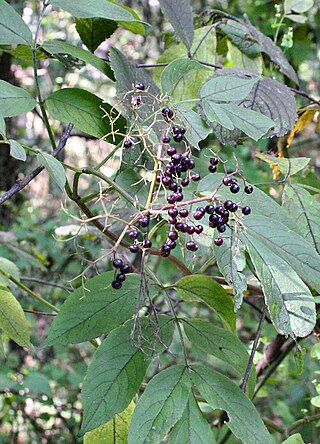
Sambucus canadensis, the American black elderberry, Canada elderberry, or common elderberry, is a species of elderberry native to a large area of North America east of the Rocky Mountains, south to Bolivia. It grows in a variety of conditions including both wet and dry soils, primarily in sunny locations.

Pulsatilla patens is a species of flowering plant in the family Ranunculaceae, native to Europe, Russia, Mongolia, and China. Common names include Eastern pasqueflower and cutleaf anemone.

Sambucus racemosa is a species of elderberry known by the common names red elderberry and red-berried elder.
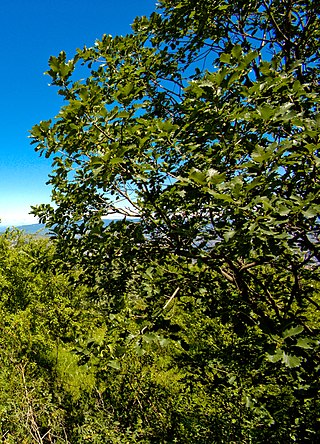
Quercus macranthera, commonly called the Caucasian oak, or the Persian oak, is a species of deciduous tree native to Western Asia that is occasionally grown as an ornamental tree in Europe growing to 30 metres tall. It is placed in section Quercus.

Erodium cygnorum is a species of herb native to Australia.
Sambucus mexicana may refer to the following North American black or blue elderberry species:
Vitis heyneana is a species of climbing vine in the grape family endemic to Asia. It can be found in shrubby or forested areas, from almost sea-level, to 3200 meters above. It has globose berries that are purple to almost black.

Allium roseum, commonly called rosy garlic, is an edible, Old World species of wild garlic. It is native to the Mediterranean region and nearby areas, with a natural range extending from Portugal and Morocco to Turkey and the Palestine region. It is cultivated widely, and has become naturalised in scattered locations in other regions outside its natural range.

Lilaeopsis schaffneriana is a rare species of flowering plant in the family Apiaceae known by the common names Schaffner's grasswort and cienega false rush.

Exochorda racemosa, the pearlbush or common pearlbush, is a species of plant in the family Rosaceae. This species is mostly found in China and Japan.
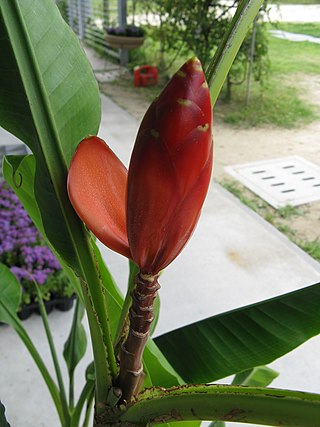
Musa beccarii is a species of wild banana, found in Malaysia, in Sabah. It is placed in section Callimusa.
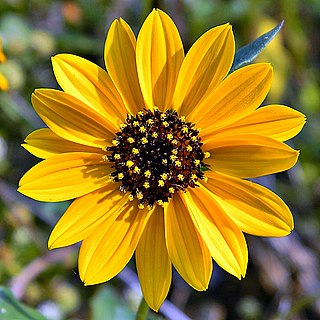
Helianthus debilis is a species of sunflower known by the common names cucumberleaf sunflower, beach sunflower, weak sunflower, and East Coast dune sunflower. It is native to the United States, where it can be found along the Atlantic and Gulf Coasts. It is known elsewhere as an introduced species, such as South Africa, Australia, Taiwan, Slovakia, and Cuba.
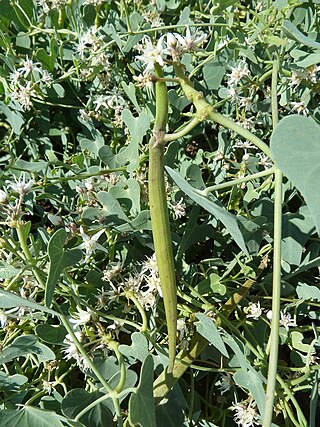
Cynanchum acutum is a species of climbing vine swallowworts native to Europe, Africa, and Asia.
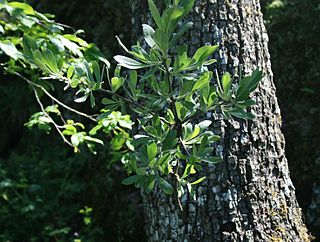
Pyrus elaeagrifolia, the oleaster-leafed pear, is a species of wild pear plant in the genus Pyrus (Rosaceae), the specific name referring to the similarity of its foliage to that of Elaeagnus angustifolia - the so-called 'wild olive' or oleaster.

Acer hyrcanum is a maple species sometimes referred to as Balkan maple. It grows in southeastern Europe and western Asia.
Hypericum annulatum subsp. intermedium is a subspecies of Hypericum annulatum, which is a species of the genus Hypericum. It was described by Norman Keith Bonner Robson.

Helianthus debilis subsp. cucumerifolius, or cucumberleaf dune sunflower, is a subspecies of the species Helianthus debilis in the genus Helianthus, family Asteraceae. It is native to the South Central regions of the United States and exists naturalized in every continent except Antarctica.

















